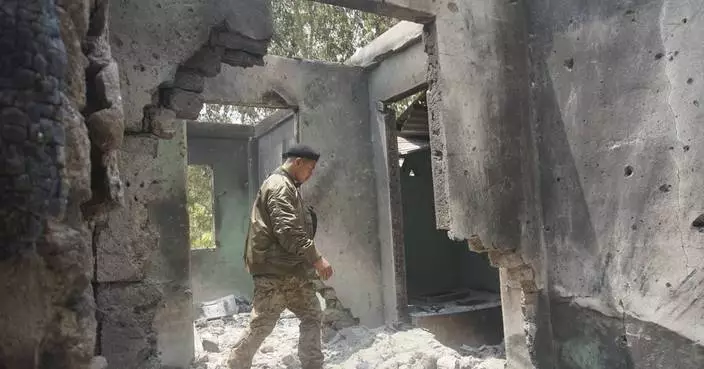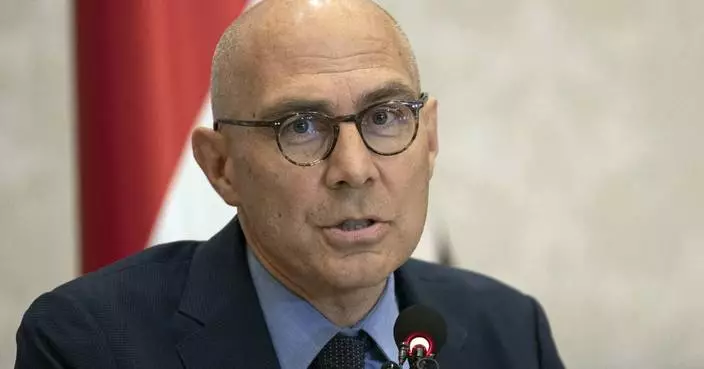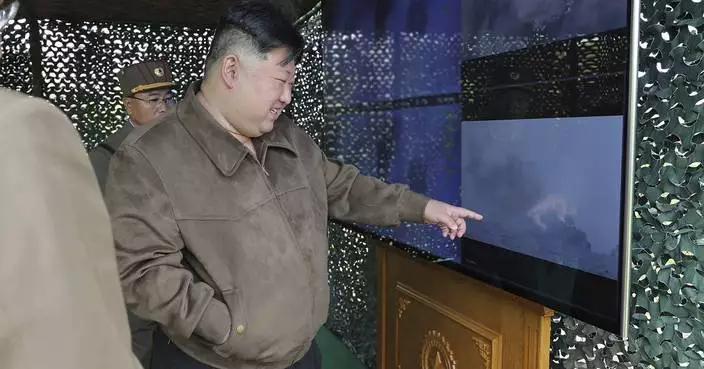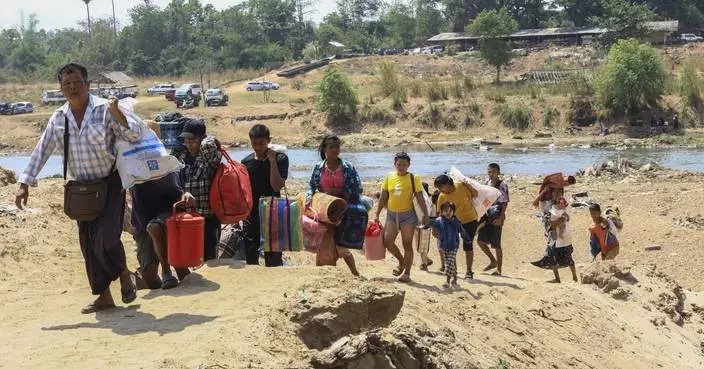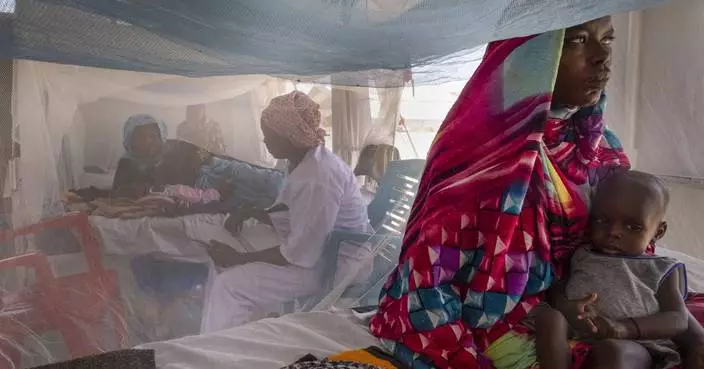Myanmar has accepted what appears to be the first five among some 700,000 Rohingya Muslim refugees who fled to neighboring Bangladesh to escape military-led violence against the minority group, even though the United Nations says it's not yet safe for them to return home.
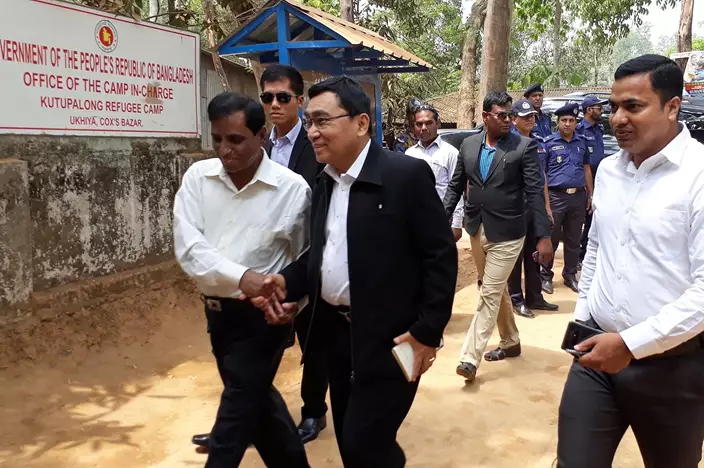
Myanmar’s Social Welfare, Relief and Resettlement Minister Win Myat Aye arrives at Kutupalong refugee camp in Cox's Bazar, Bangladesh, Wednesday, April 11, 2018. About 700,000 Rohingya who face severe discrimination in Myanmar have fled to neighboring Bangladesh to escape a brutal army counterinsurgency campaign. Efforts are underway to arrange their return. (AP Photo/Suzauddin Rubel)
A government statement said Saturday that five members of a family returned to western Rakhine state from the border area.
The statement said authorities determined whether they had lived in Myanmar and provided them with a national verification card. The card is a form of ID, but does not mean citizenship — something Rohingya have been denied in Buddhist-majority Myanmar, where they've faced persecution for decades.
It said that the family was staying temporarily with relatives in Maungdaw town, the administrative center close to the border.
The statement did not say if any more repatriations are being planned. Bangladesh has given Myanmar a list of more than 8,000 refugees to begin the repatriation, but it has been further delayed by a complicated verification process.
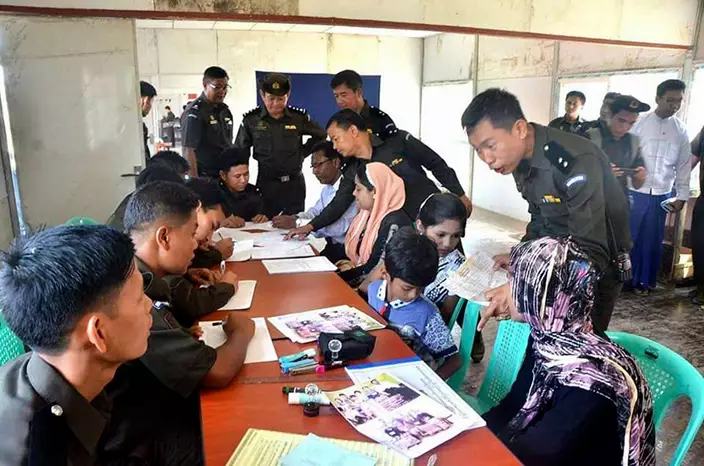
In this April 14, 2018, photo provided by Myanmar Government Information Committee, Myanmar immigration officials examine documents and photographs with a Rohingya family of five at a receiving center in Taung Pyo, Letwe, northern Rakhine state. Myanmar has accepted what appears to be the first five among some 700,000 Rohingya Muslim refugees who fled military-led violence against the minority group, even though the U.N. says it is not yet safe for them to return home. (Myanmar Government Information Committee via AP)
The two countries agreed in December to begin repatriating them in January, but they were delayed by concerns among aid workers and Rohingya that they would be forced to return and face unsafe conditions in Myanmar.
Hundreds of Rohingya were reportedly killed in the recent violence, and many houses and villages burned to the ground. The United Nations and the U.S. have described the army crackdown as "ethnic cleansing."
On Friday, the U.N. refugee agency and Bangladesh finalized a memorandum of understanding that describes the repatriation process as "safe, voluntary and dignified ... in line with international standards."
UNHCR said it "considers that conditions in Myanmar are not yet conducive for returns to be safe, dignified, and sustainable. The responsibility for creating such conditions remains with the Myanmar authorities, and these must go beyond the preparation of physical infrastructure to facilitate logistical arrangements."
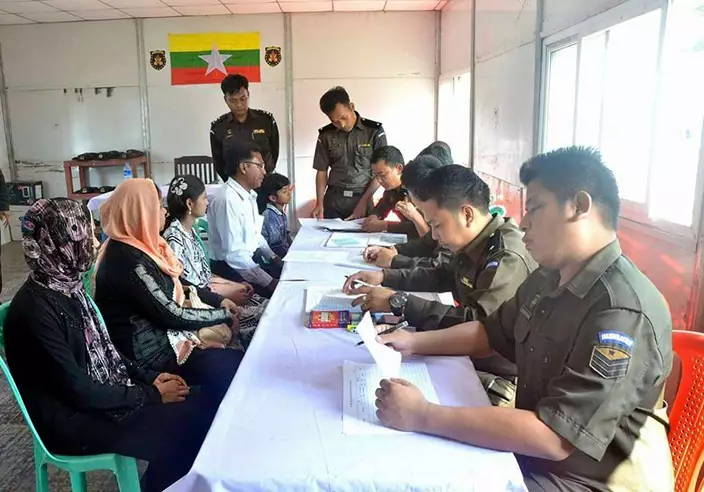
In this April 14, 2018, photo provided by Myanmar Government Information Committee, Myanmar immigration officials examine documents as a Rohingya family of five look on at a receiving center in Taung Pyo, Letwe, northern Rakhine state. Myanmar has accepted what appears to be the first five among some 700,000 Rohingya Muslim refugees who fled military-led violence against the minority group, even though the U.N. says it is not yet safe for them to return home. (Myanmar Government Information Committee via AP)
Earlier in the week, Myanmar Social Welfare Minister Win Myat Aye met with about 40 Rohingya refugees at the Kutupalong camp in Cox's Bazar in Bangladesh for more than an hour, sometimes exchanging heated words.
A Rohingya leader, Abdur Rahim, said at least eight rape victims were among those who met with him. Rahim said the group presented 13 demands for the government to meet for their return to Myanmar.
Rahim said the group became angry when Win Myat Aye said the Rohingya refugees must accept national verification cards to be provided by Myanmar in which they state they are migrants from Bangladesh.
Rohingya Muslims have long been treated as outsiders in Myanmar, even though their families have lived in the country for generations. Nearly all have been denied citizenship since 1982, effectively rendering them stateless. They are denied freedom of movement and other basic rights.
Rahim said they demanded to be recognized as citizens of Myanmar before the repatriation starts and that their security arrangements be supervised by the United Nations.
Rohingya who have been repatriated in the past after previous refugee exoduses have been forced to live in camps in Myanmar.
WASHINGTON (AP) — Lawyers for an American believed to be held by the Taliban for nearly two years are asking a United Nations human rights investigator to intervene, citing what they say is cruel and inhumane treatment.
Ryan Corbett was abducted Aug. 10, 2022, after returning to Afghanistan, where he and his family had been living at the time of the collapse of the U.S.-based government there a year earlier. He arrived on a valid 12-month visa to pay and train staff as part of a business venture he led aimed at promoting Afghanistan's private sector through consulting services and lending.
Corbett has since been shuttled between multiple prisons, though his lawyers say he has not been seen since last December by anyone other than the people with whom he was detained.
In a petition sent Thursday, lawyers for Corbett say that he's been threatened with physical violence and torture and has been malnourished and deprived of medical care. He's been held in solitary confinement, including in a basement cell with almost no sunlight and exercise, and his physical and mental health have significantly deteriorated, the lawyers say.
Corbett has been able to speak with his family by phone five times since his arrest, including last month. His family has not been able to see him — his only visits have been two check-ins from a third-party government — and their characterizations of his mistreatment are based on accounts from recently released prisoners who were with him and his openly dispirited tone in conversations.
“During Mr. Corbett’s most recent call with his wife and children, Mr. Corbett indicated that the mental torture and anguish have caused him to lose all hope,” said the petition, signed by the Corbett family attorneys, Ryan Fayhee and Kate Gibson.
The petition is addressed to Alice Edwards, an independent human rights investigator and the special rapporteur for torture in the Office of the High Commissioner for Human Rights at the U.N. It asks Edwards, who was appointed by the U.N. Human Rights Council, to “urgently reach out to the Taliban to secure Mr. Corbett’s immediate release and freedom from torture, as guaranteed by international law.”
"This situation is just dragging on, and I’m increasingly concerned and taking steps that I hope will make a difference and help the situation — just increasingly concerned and panicking about Ryan’s deteriorating health and physical and mental health," Corbett's wife, Anna, said in an interview. “And that was leading me to take this next step.”
The U.S. government is separately working to get Corbett home and has designated him as wrongfully detained. A State Department spokesman told reporters last month that officials had continually pressed for Corbett's release and were “using every lever we can to try to bring Ryan and these other wrongfully detained Americans home from Afghanistan."
A spokesperson for the Interior Ministry in Afghanistan said this week that it had no knowledge of Corbett's case.
Corbett, of Dansville, New York, first visited Afghanistan in 2006 and relocated there with his family in 2010, supervising several non-governmental organizations.
The family was forced to leave Afghanistan in August 2021 when the Taliban captured Kabul, but he returned the following January so that he could renew his business visa. Given the instability on the ground, the family discussed the trip and “we were all pretty nervous,” Corbett's wife said.
But after that first uneventful trip, he returned to the country in August 2022 to train and pay his staff and resume a business venture that involved consulting services, microfinance lending and evaluating international development projects.
While on a trip to the northern Jawzjan province, Corbett and a Western colleague were confronted by armed members of the Taliban and were taken first to a police station and later to an underground prison.
Anna Corbett said that when she learned her husband had been taken to a police station, she got “really scared” but that he was optimistic the situation would be quickly resolved.
That, however, did not happen, and Anna Corbett, who has three teenage children and makes regular trips to Washington, said she's trying to advocate as forcefully as she can while not letting “anxiety take over.”
“I feel like it’s the uncertainty of all of it that just is so difficult because you just don’t know what’s going to come at you — what call, what news," she said. "And I’m worried about Ryan and the effect of the trauma on him and then also on my kids, just what they’re experiencing. I've tried to protect them the best I could, but this is so difficult.”
Associated Press writer Riazat Butt in Kabul, Afghanistan, contributed to this report.
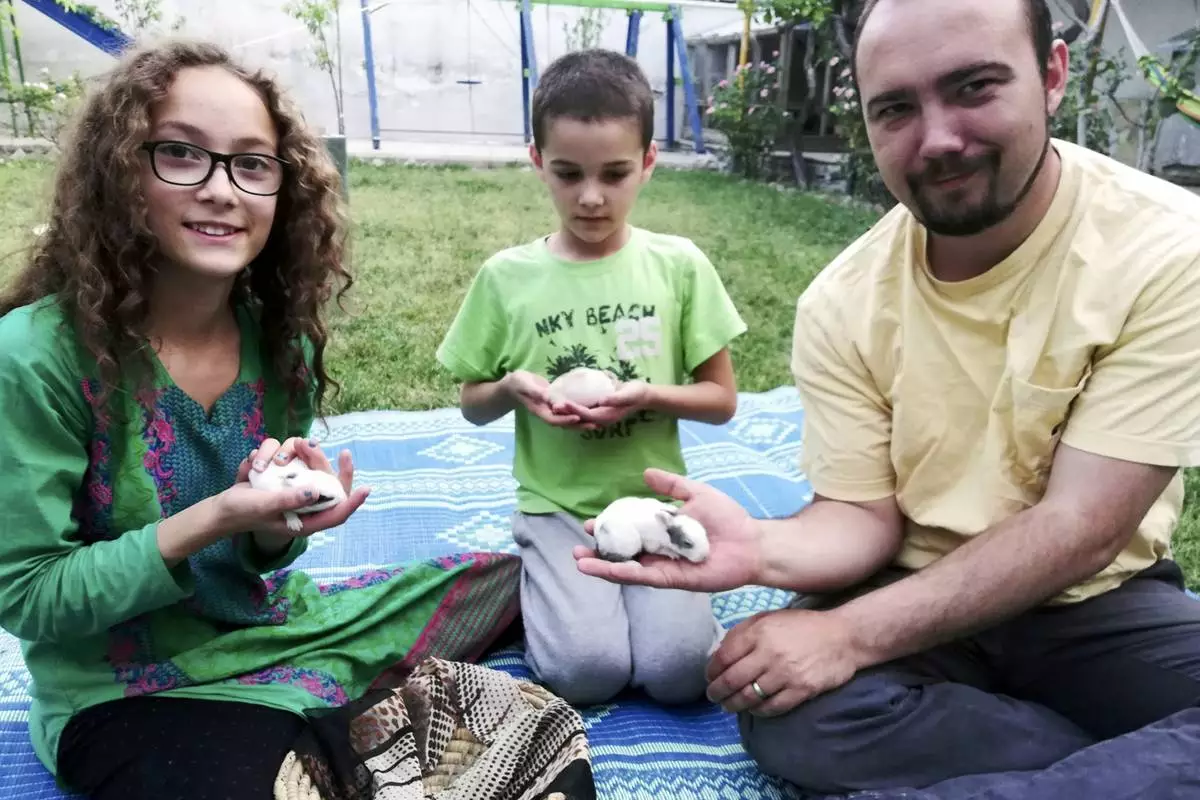
This family photo shows Ryan Corbett holding rabbits with his daughter Miriam and son Caleb in Kabul, Afghanistan in 2020. Lawyers for Corbett, believed held by the Taliban for nearly two years, are asking a United Nations human rights investigator to intervene, citing what they say is cruel and inhumane treatment. Corbett was abducted on August 10, 2022 after returning to Afghanistan, where he and his family had been living at the time of the collapse of the U.S.-based government there one year earlier, on a valid 12-month business visa to pay and train staff. (AP Photo/Anna Corbett)









